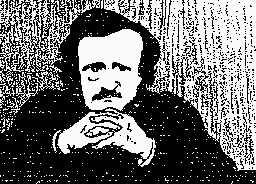| Page
10 : Edgar Allan Poe |
 |
||
| Born
in 1809 in Boston, Edgar Poe will quickly be famous in France due to
the traductions of his works by the French poets Baudelaire and
Mallarmé. The American writer was - as his two translators -one
of the young Ravel's artistic passions. He reads the Histoires extraordinaires when he was 16, and tries to paint upon the short story Descente dans le
Maëlstrom. In July 1931 he says that : "The best composition treatise, according to me, that which had, in any case, the largest influence upon me, is [Poe's]
"Genèse d'un poème" [The Philosophy of Composition]."
|
|||
 |
|||
 The philosophy of composition "In carefully thinking over all the usual artistic effects [...] I did not fail to perceive immediately that no one had been so universally employed as that of the refrain." The need to vary it. "Its application was to be
repeatedly varied, it was clear that
the refrain
itself
must be brief, for there would have been an
insurmountable difficulty in frequent variations
of application in any sentence of length. In proportion to the
brevity
of the sentence, would, of course, be the facility of the variation.
This led me at once to a single word as the best refrain."
The under current... "Two things are invariably required — first, some amount of complexity, or more properly, adaptation; and, secondly, some amount of suggestiveness — some under current, however indefinite of meaning." |
In The philosophy of composition, Poe shows the logic he had used to create the poem The Raven. | ||
 |
|||
A refrain, varied, like an under current ? You mean a hidden musical dedication, transcibing the name and the surname of a close friend of Ravel ? |
|||
 |
|||
| There, you can read, in French, more on this topic. |
|||
 |
David Lamaze
Le Cygne de Ravel ~ Le Coeur de l'horloge
Le Cygne de Ravel ~ Le Coeur de l'horloge